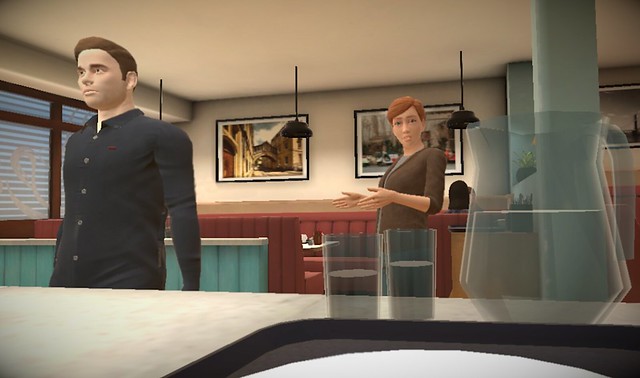A new clinical trial beginning on 1st July is testing a virtual reality (VR) based psychological therapy for people with severe mental health difficulties. gameChange is the largest ever clinical trial of virtual reality for a mental health disorder.
Over 400 NHS patients across England (Bristol, Manchester, Newcastle, Nottingham and Oxford) will take part in the trial, which will last 18 months and is funded by the National Institute for Health Research. The purpose of the trial is to find out whether VR therapy works. To do this, half the participants will receive the VR therapy and half will not. A comparison will then be made to see how the people who received VR therapy got on compared to those who did not receive the therapy.
“The gameChange VR therapy is for people with conditions such as schizophrenia whose fears have caused them to withdraw to such an extent that everyday tasks – such as getting on a bus, doing the shopping, speaking to other people – are a challenge. It aims to help patients re-engage with the world and go into everyday situations feeling more confident, calm and in control.”
Daniel Freeman, gameChange lead researcher, Professor of Clinical Psychology, University of Oxford and Consultant Clinical Psychologist, Oxford Health NHS Foundation Trust
There are currently 220,000 patients diagnosed with schizophrenia in contact with mental healthcare services in the NHS in England and Wales. Two-thirds of these patients have levels of anxious avoidance equivalent to people with agoraphobia. Automated delivery of therapy using VR has potential to transform NHS provision of psychological therapy for patients like these.
“I really hope that the therapy will be implemented in the NHS. This therapy can be delivered by peer support workers. That’s a real positive”
Debbie Butler, gameChange Lived Experience Advisory Panel
The VR therapy being tested has been created by designers and computer programmers working side-by-side with people with lived experience of psychosis. It is hoped that the treatment will lead to patients being more able to go into everyday situations and experience fewer/less severe psychiatric symptoms.
“Almost every aspect of the gameChange study has been designed in collaboration with people with experience of psychosis. The result is a study that we hope will be relevant, effective, and accessible and which focuses on helping people with day-to-day social situations”
Dr Thomas Kabir, Head of Public Involvement at Mental Health Charity The McPin Foundation

This trial is being funded by the NIHR i4i mental health challenge award and it is also supported by the NIHR Oxford Health Biomedical Research Centre.
Key facts about:
gameChange trial
- It tackles a serious issue: the social withdrawal of many patients with severe mental health difficulties
- Whether a person has the VR therapy is decided by chance
- Everyone in the trial completes an assessment at the beginning, which is repeated after 6 weeks and again after six months
- Automated therapy means that if the treatment works it will be much easier to help many more patients
VR therapy
- gameChange is an easy to use, step by step programme that allows a person to practise at their own pace being in a range of everyday situations
- The therapy is provided in 6 thirty-minute sessions in VR
- A virtual coach guides the person in how to overcome their fears
- The virtual coach is animated using motion capture and voices of an actor and provides information on how to overcome anxiety.
- The virtual coach is a calm presence and guides the user through the VR tasks to get the greatest benefit, performing an almost identical role to a real life therapist.
- Patients are willing to enter VR simulations of anxiety-provoking situations because they know the simulations are not real, but what they learn transfers to the real world
- At the beginning of the first session, the
virtual coach explains the rationale behind the treatment, and the participant
selects which one of six virtual reality situations:
- Café
- GP waiting room
- Pub
- Bus
- Street scene
- Newsagent
- Each scenario has five levels of difficulty (e.g. the number and proximity of people in the social situation increases) and participants work their way through each level of difficulty


